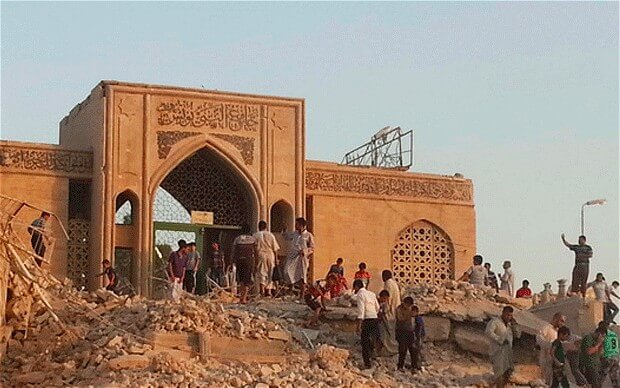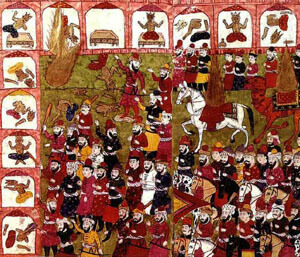Ricochet is the best place on the internet to discuss the issues of the day, either through commenting on posts or writing your own for our active and dynamic community in a fully moderated environment. In addition, the Ricochet Audio Network offers over 50 original podcasts with new episodes released every day.
 Builders and Destroyers
Builders and Destroyers
The news from Iraq these past few weeks has been horrific. Most of us have either seen, or heard descriptions of, the pictures of the massacres. If for some reason you haven’t, consider yourself lucky: I was prepared for the blood, but it’s the boyish smiles I can’t un-remember.
these past few weeks has been horrific. Most of us have either seen, or heard descriptions of, the pictures of the massacres. If for some reason you haven’t, consider yourself lucky: I was prepared for the blood, but it’s the boyish smiles I can’t un-remember.
In addition to the human carnage, there’s also been a consistent pattern of Islamists destroying buildings dating back centuries — even millennia — that they feel to be blasphemous. Late last month, for instance, they destroyed the shrine believed to be the tomb of the Prophet Jonah, as well as a couple of dozen other religious sites and monuments. These aren’t matters of collateral damage or simply the casualties of war: these are intentional operations involving dynamite and sledgehammers.
http://youtu.be/SLUB8dqoVnE
The practice, it seems, is typical for ISIS and al-Qaeda. Jihadis blew-up the al-Askari Mosque — one of the holier sites to the Shia — in both 2006 and in 2007. The Taliban, too, dynamited the Buddhas of Bamiyan, probably their most infamous action before their association with 9/11. It was no small effort, either: the operation was expensive and took weeks to complete.
Destruction, of course, is hardly unique to Jihadis: Westerners have pulled things down, blown others up, and practiced all kinds of murder and rapacity with intent throughout our history. With a few exceptions, however, this will to destroy was always accompanied by a desire to create. The Roman destructions of Carthage and Jerusalem — to take two notable, but hardly unique, examples — were awful, but should be seen in the context of what they also built. Heck, even the Nazis were as famous for stealing artistic treasures as they were for burning books.
I’m no expert this, but the problem doesn’t seem to be Islam, or even Sunni extremism: Muslims have created and celebrated beautiful art and architecture — including most of those being destroyed now — for centuries and continue to do so today. Even the Saudis and Emirs, awful as they are, are able to combine their religion with doing something constructive (though I’ll refrain from commenting on their taste). Rather, the problem seems to be the Jihadi’s narrow, barbaric, iconoclysm married an equally nasty and violent millenarianism that calls for death and damnation on everything but itself.
The good news is that the very thing that animates these monsters handicaps them in the long term. ISIS has no capability of building new weapons on its own, and their ability to purchase new materials will almost certainly be handicapped by their celebrations of their barbarity. But they can’t build anything: “decapitating little girls with a knife” and “blowing-up ancient shrines” aren’t job skills that translate easily to other fields and happen to be exactly what attracts people to ISIS and what gets them up in the morning. The money they stole will eventually run out, the oil refinery they seized was back in Iraqi hands last I checked (and severely damaged), and ransom and thievery can only get one so far.
That doesn’t mean they’re not dangerous or that the world should shrug its shoulders at what they’re doing: barbarians can cause enormous amounts of harm if left unchecked, as we’ve seen so many times before. It does mean that we’ve got a huge moral, economic, military, and aesthetic advantage over them: we can build things and they can’t.
Image credit: The Telegraph.
Published in General



Well, yes, but we build clocks and golf clubs and they have the time and religious fervor.
We also build tanks.
Yes it is true they don’t make much but these nihilistic regimes always manage to find enough creativity to make their killing tools and keep their swords sharp. Their people will go naked and hungry, but you can be sure their soldiers will not lack for bullets.
Your thinking is far too long range. The history of religious nihilists is one of successfully destroying with no desire to eventuate beyond the destruction. In the case of Islam, the religious fervor is itself the thing they will build. Spend time in any Islamic country and you will be impressed by the filth and decay that surrounds you. A few Westernized Muslims build, but for most the religious fervor is it’s own reward.
Ryan M said he wanted to go to St. Andrew’s, where my wife and I studied theology, and the old ecclesiastical and political capital of Scotland. He said he wanted to see some of the history of Presbyterianism. Other than a slightly odd miracle (the somewhat vague image of a martyr’s face mystically transferred to a church wall), which I didn’t think Ryan would be into, I couldn’t think of anything, so I asked my wife. She suggested he went to see the ruins of the Cathedral.
It’s not true everywhere that the architectural history of the first century of Presbyterianism can be found in the destruction of what came before them, but it’s pretty true. Nonetheless, those Scots built , with a little help, the greatest empire the world has known, and some nice building followed the prosperity that accompanied that.
Thanks for the post Tom! Allow me to add a bit of info. When Muhammad conquered Mecca, he destroyed the idols in the Kaaba. I’m no expert on Islam, but I if I recall correctly, it’s one of the most significant stories in Islam. It teaches about the cleansing of conquered lands and holy places. Of course most Muslims today don’t wish to destroy non-Muslim sacred objects, and such razing is not unique to Islam, but it’s not a big leap to see how the jihadist terrorizing the middle east these days would view themselves as following in the footsteps of their prophet with such destruction. (Picture: Muhammad destroying the idols of the Kaaba)
I feel this is the wrong approach, as it is mere victor’s justice:
Now picture the current wave of savagery in the context of the global caliphate being admired centuries and millennia down the road by a grateful ummah. Carthginians didn’t think much of the subsequent developments, and the current long-standing situation in the Middle East may owe a lot to the Roman expansion and collapse.
History is large, and a lot of things happen (hey, somebody has to expand and collapse), but using construction to justify genocide and cultural obliteration seems wrong.
I don’t mean to justify the genocides, though I am justifying Roman civilization whose armies committed the genocides. The Romans built far more than they destroyed.
I think the real problem is one of scope. You make it clear that Islam, like Rome, has destroyed stuff and built impressive stuff. You note, though, that some Muslims (perhaps like some Romans) are more focused on the destructive side of things. I think you might be right about IS (although part of what makes IS interesting is the degree to which it is far more professional in its use of western media and merchandising, and far more interested in genuine state building than its predecessors were), but IS is still far too small to be called a civilization.